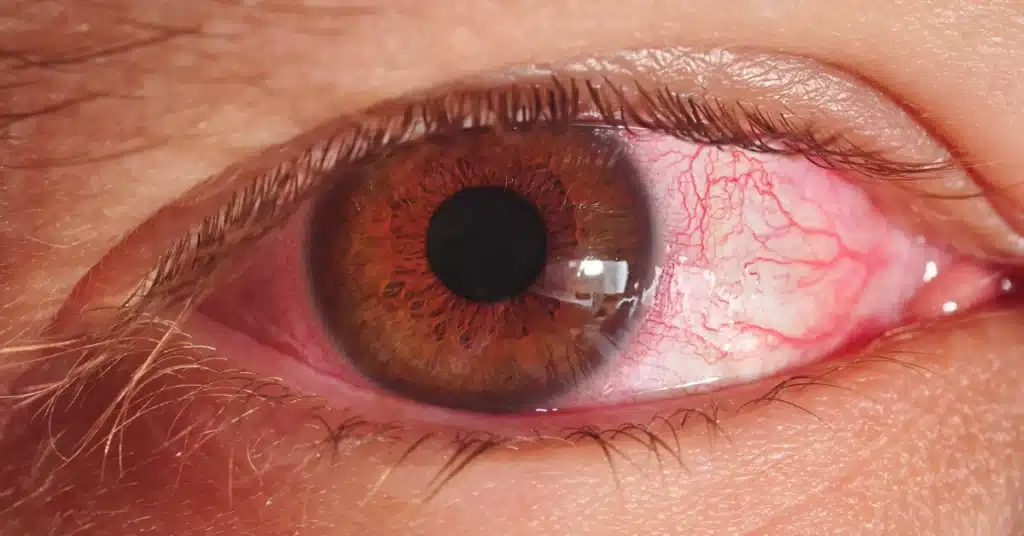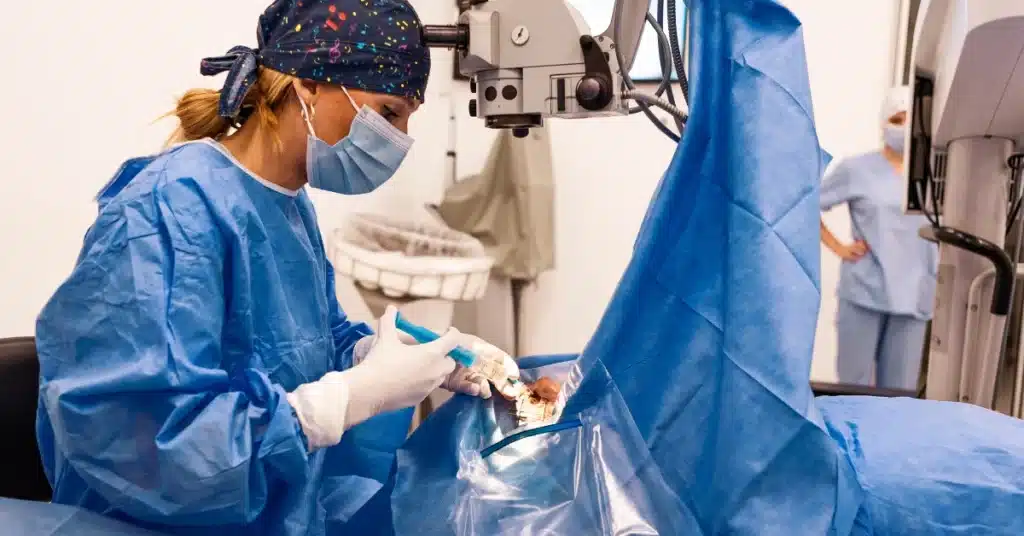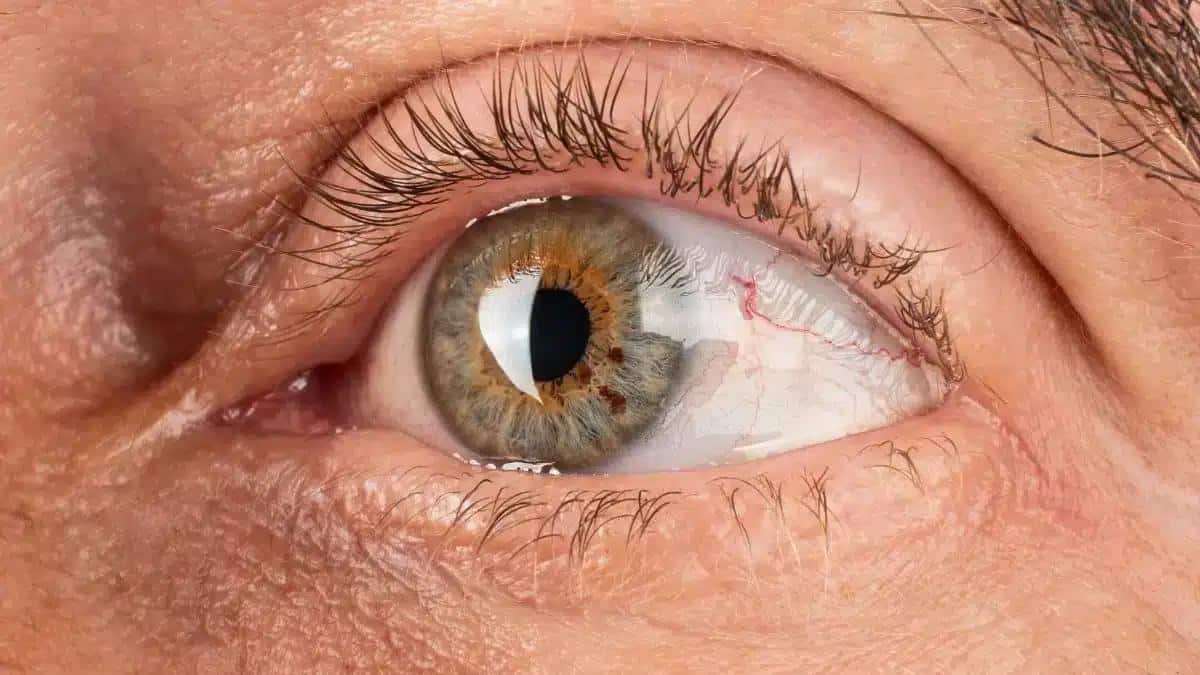Peripheral Ulcerative Keratitis is a serious eye condition that causes eye inflammation and the growth of ulcers on the cornea.
The cornea is the outermost transparent layer of the eye responsible for refracting light.
However, Ulcerative Keratitis can cause vision problems and may lead to eye redness, blurred vision, and more.
Let us explore more about Ulcerative Keratitis, its symptoms, causes, and various treatment options.
What is Peripheral Ulcerative Keratitis
Peripheral Ulcerative Keratitis (PUK) is an advanced type of Keratitis that affects the peripheral cornea.
PUK is also known as Corneal Ulceration and is a rare eye condition that leads to cornea inflammation, ulcers, and thinning.
The inflammation normally affects the corneal stroma and may cause the breakdown of the corneal tissue.
Peripheral Ulcerative Keratitis can result in various vision problems, pain, and discomfort.
PUK is also associated with systemic autoimmune disorders like Rheumatoid Arthritis, Lupus, and more.
Therefore, early diagnosis and treatment of PUK are important due to its connection with immune-mediated diseases.
Ulcerative Keratitis Symptoms
 Source: dtimiraos_from_Getty_Images
Source: dtimiraos_from_Getty_ImagesThe symptoms of Ulcerative Keratitis are important for timely diagnosing and treating the condition.
However, the symptoms may vary, but the common symptoms include:
- Eye pain
- Eye irritation
- Photophobia (Light sensitivity)
- Red Eyes
- Blurred vision
- Excessive tearing
- Eye discharge
Observe and recognize these symptoms to help prevent serious complications such as vision loss.
Also, consult a doctor if the symptoms are consistent.
Ulcerative Keratitis causes
Understanding the causes of Ulcerative Keratitis is important for understanding the condition better and effective treatment.
The causes of Ulcerative Keratitis include infections, trauma, dry eye syndrome, and autoimmune disorders.
Let us explore the causes in detail.
Infections: Bacterial, viral, and fungal eye infections are common causes of Ulcerative Keratitis. Microorganisms can enter the cornea through injuries, contact lens misuse, or more. The common pathogens include Staphylococcus Aureus, Pseudomonas Aeruginosa, Herpes Simplex Virus, and more.
Trauma: Physical injuries to the cornea, like scratches, cuts, or more, can create an opening for infections and increase the risk of Ulcerative Keratitis. Improper use of contact lenses can also increase the risk of corneal trauma.
Dry Eye Syndrome: Dry Eyes can make the cornea more sensitive to damage due to insufficient tear production and poor tear quality. Therefore, Dry Eye is a common factor that can contribute to Ulcerative Keratitis.
Autoimmune disorders: Conditions like Rheumatoid Arthritis, Lupus, and other autoimmune disorders can lead to corneal ulcers by triggering inflammation in the eye. The body’s immune system may sometimes mistakenly target healthy tissues like the cornea.
Consult a doctor for a proper diagnosis.
Ulcerative Keratitis treatment options
 Source: Nastasic_from_Getty_Images
Source: Nastasic_from_Getty_ImagesTimely treatment of Ulcerative Keratitis is important as it helps prevent serious complications like vision loss.
The Ulcerative Keratitis treatment options include topical medicines, anti-inflammatory medications, pain medicines, and surgery.
Let us explore the treatment options in detail.
Topical medicines: The choice of topical medicine depends on the type of infection causing Ulcerative Keratitis.The doctors may prescribe antibiotic eye drops for bacterial infections, antifungal eye drops for fungal infections, and antiviral eye drops for viral infections.
Corticosteroids: Inflammation is often managed with anti-inflammatory medications like corticosteroid eye drops. However, get a proper prescription from a doctor, as they can worsen the eye infection.
Pain management: Pain relievers and lubricating eye drops may be recommended to help with discomfort.
Surgery: The doctors may suggest surgical procedures such as corneal transplantation in serious cases or when there is a risk of vision loss.
Consult an eye doctor and discuss your symptoms for an effective treatment plan.
Key takeaways
Peripheral Ulcerative Keratitis (PUK) is a rare eye condition that affects the peripheral cornea and leads to inflammation, ulcers, and thinning.
The serious eye condition can cause many vision problems, eye pain, Red Eyes, irritation, and more.
The causes of Ulcerative Keratitis include infections, trauma, dry eye syndrome, and autoimmune disorders.
It is important to observe and recognize the causes and symptoms to help in the effective treatment of the condition.
The Ulcerative Keratitis treatment options include topical medicines, anti-inflammatory medications, pain medicines, and surgery.
Frequently Asked Questions
What is the most common cause of Ulcerative Keratitis?
Infections are the most common cause of Ulcerative Keratitis, as they can easily affect the cornea through injuries or contact lens misuse. However, Rheumatoid Arthritis is the most common non-infectious cause of PUK.
What are the signs of Peripheral Ulcerative Keratitis?
The symptoms of Peripheral Ulcerative Keratitis include Red Eye, eye pain, photophobia (light sensitivity), blurred vision, and inflammation along the peripheral cornea. Consult an eye doctor if you experience these symptoms.
Can Ulcerative Keratitis cause blindness?
Yes, untreated Ulcerative Keratitis can lead to blindness. The untreated condition may result in corneal scarring, vision impairment, and permanent damage.
Early diagnosis is important to prevent serious complications and maintain eyesight.
What happens if Ulcerative Keratitis is not treated?
Untreated Ulcerative Keratitis can lead to serious complications like corneal scarring, vision loss or blindness, Glaucoma, and more. The infection and inflammation can advance and cause severe damage to the cornea.
How to prevent Ulcerative Keratitis?
One can prevent Ulcerative Keratitis by maintaining good eye hygiene, practicing proper contact lens care, and avoiding eye injury. A person should get regular eye examinations and wear protective eyewear to minimize the risk of developing Ulcerative Keratitis.
When referencing outside resources, GoodrxMedicine always provides full citations. To learn more about the measures we use to maintain the quality of our content, please review our Content Information Policy.











